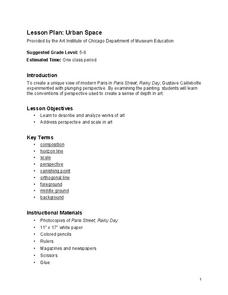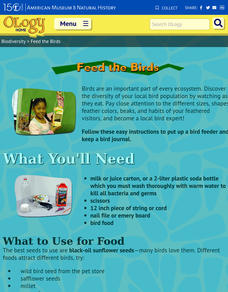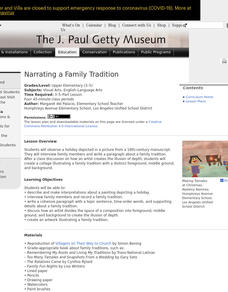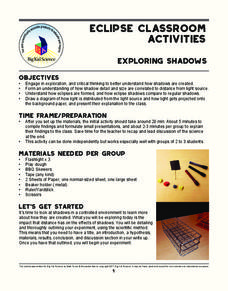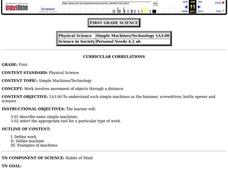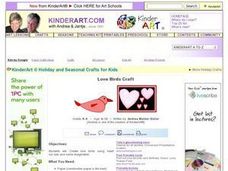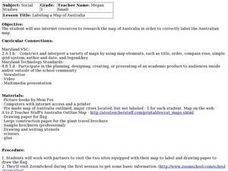August House
The Ogre Bully
English language arts, math, science, dramatic arts, and cooking; this lesson has it all! In this multidisciplinary resource, your scholars will take part in a read aloud of The Ogre Bully by A.B. Hoffmire and have a grand...
DiscoverE
Marble Run
It's time to slow your roll! Can your class create a track that allows a marble to roll as slowly as possible? Teams of science scholars collaborate to design, build, and test their tubes while learning about gravity and friction.
Art Institute of Chicago
Urban Space
The use of perspective is clear in Paris Street; Rainy Day by Gustave Caillebotte. Pupils study and discuss this example, marking the vanishing points and horizon line of a photocopy of the piece. They then create their own urban scene...
DiscoverE
Designing Highway Interchanges
How do engineers determine the most efficient highway designs? Introduce young scientists to the world of topology, the branch of mathematics that examines how things are connected. Teams use model highways to create the most...
DiscoverE
Kinetic Sculpture
Let your creativity run wild. Scholars build a sculpture out of basic materials. These sculptures must be able to move in the wind (from an electric fan). However, they must also withstand the wind enough to not fall over—it's quite the...
American Museum of Natural History
Feed the Birds
What kinds of birds are common in the area? Young scientists use household supplies to create bird feeders. They then document the birds that come to their feeders by keeping journals.
Facing History and Ourselves
Unit Assessment: From Identity to Action
Four projects enable class members to show what they have learned about ways they can stand up for democracy. to begin, individuals review their identity charts and craft a mask that represents themselves. Next, groups create a short,...
J. Paul Getty Trust
Narrating a Family Tradition
After examining a piece of art, scholars discuss what they see, paying close attention to details and space. A read-aloud introduces the topic of family traditions. Pupils interview their family members about a tradition in preparation...
Energy for Keeps
Going for a Spin: Making a Model Steam Turbine
Discover the effectiveness of wind, water, and steam as energy sources. The hands-on activity has young scientists create a turbine from common materials. After constructing the turbines, they use wind, water, and steam to turn them and...
Big Kid Science
Exploring Shadows
What's that lurking in the shadows? An activity that demonstrates how eclipses happen. Science scholars investigate how light and distance interact to form shadows. The experiment uses simple materials to generate data and observations...
Curated OER
Ten
Students create their own counting book and brainstorm ideas with each other for a concept. In this counting lesson plan, students first read books such as Ten by Keith Haring.
Curated OER
A Waste Not Snowman
Students use everyday items to make a snowman. They collect items and bring them into school. They use glue to put the pieces together. They share their snowman with the class.
Curated OER
Memory Game with a Smile
Learners take it in turns to say two letters and then they turn the corresponding cards around to see if the pictures/words on them match. If they do, student who has found the pair wins 1 point.
Curated OER
Social Studies: Class Citizenship Tree
Third graders discuss citizenship and the meaning of the Pledge of Allegiance. On poster board, the teacher draws a tree and students draw their citizenship ideas on paper or clip pictures from magazines and glue them to the tree.
Curated OER
Symmetry in Shapes and Everyday Objects
Fifth graders discover lines of symmetry for shapes and everyday objects. In this lines of symmetry lesson plan, 5th graders use a butterfly outline to find lines of symmetry. Students analyze everyday objects for symmetry and use...
Curated OER
Plenty of Pythagoras
Using a twelve foot knotted rope, students form a 3-4-5 right triangle. Following a discussion of observations about the lengths of the sides of the triangle, students use grid paper, scissors and a centimeter ruler to draw and measure...
Curated OER
Simple Machines
First graders study and describe simple machines such as the hammer, screwdriver, nutcracker, bottle opener and scissors and select the appropriate tool for a particular type of work.
Curated OER
Pair 'Em Up!
Third graders verify the validity of Punnett squares. They simulate a real-world situation by drawing chromosomes from a paper bag and track the data.
Curated OER
Looking at shapes, colours and patterns in Flowers and Butterflies
Students study patterns, lines, shapes, and colors in both flowers and butterfly wings. They create their own flower and butterfly drawings and/or models to reinforce the concept.
Curated OER
Love Birds
Young scholars create birds using construction paper, pencils, scissors, glue, and heart shapes in this Art instructional activity for the elementary classroom. The instructional activity could be used for a Valentine's Day activity or...
Curated OER
Symme"tree"
Students practice drawing lines of symmetry after the teacher draws shapes on the board. They create a class symme"tree" using only symmetrical shapes to decorate it.
Curated OER
Labeling a Map of Australia
Third graders label a map of Australia. Using the internet, they research the history and maps of the continent and print a blank map. They review on how to use a compass rose and legend. In groups, they create a brochure to share...
Curated OER
Chinese New Year
Third graders discuss with the teacher what they know about the Chinese New Year and then watch a video on the topic. They then discuss what they learned about Chinese New Year and then they refer to their January booklet to cut out a...
Curated OER
Animal Adaptations
students in groups to work on bulletin board, making a list of animal adaptations. They write an example of each body covering and find pictures of animals with these coverings. They mount pictures and label the covering. They should be...




